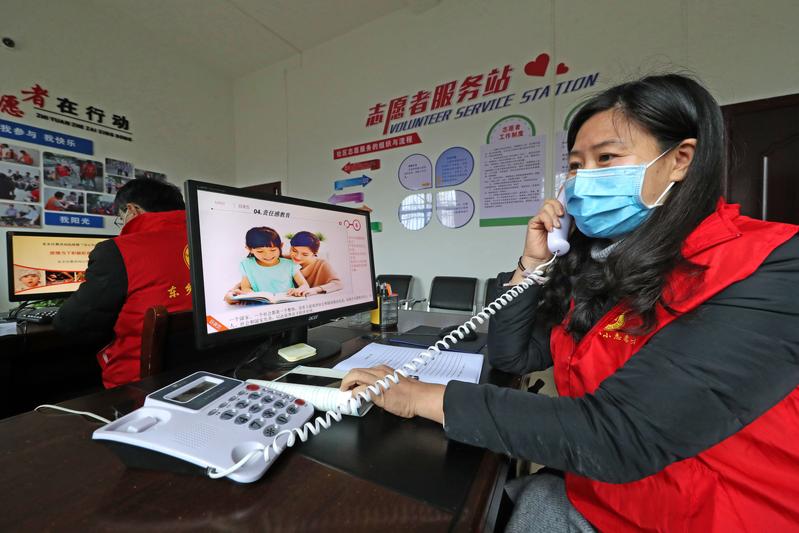Market forces leave consumers of therapies, drugs and counseling still searching for more effective solutions
 Wang Chenchen, a psychologist in No 1 Hospital in Qinhuangdao city, Hebei province, offers music therapy to a patient. (CAO JIANXIONG / FOR CHINA DAILY)
Wang Chenchen, a psychologist in No 1 Hospital in Qinhuangdao city, Hebei province, offers music therapy to a patient. (CAO JIANXIONG / FOR CHINA DAILY)
Yang Zhi, 21, a student in Qingdao, Shandong province, waited for two hours before he could finally get in for a follow-up diagnosis by a psychologist. All he received instead was just five minutes for a brief chat.
Devastated, Yang wondered if consulting a psychologist for mental health solutions was the right thing to do anymore, given that the field appears to have acquired dimensions of a booming, profitable business.
Yang recalled with a sad face later: "It was different from what I had expected-a longer chat on my recent experiences. I also wanted to know if it's normal to forget things after starting to take prescribed antidepressants. But, my psychologist looked so hurried. She was frequently gazing at the long queue outside her office, and I couldn't get my mind straight in that situation."
Yang went on to recall his first-time visit to the clinic. "It was almost the same. I waited for more than an hour to see the doctor. It struck me that there were so many people who looked just fine from the outside but were struggling with various difficulties in their lives, just like me."
He soon turned to online psychological consulting platforms, as suggested by his friends.
"Offline clinics are crowded all the time. My friends told me online platforms are easier to access, have good confidentiality and can help users avoid the potential awkwardness of running into an acquaintance or a colleague, and are more flexible," Yang said.
"However, I was shocked to see some of the online counselors identifying themselves with fancy designations like 'relationship expert' and 'spiritual hypnosis instructors'.They offer services such as saving a relationship, helping one relieve stress after a breakup, as well as dealing with anxiety and obsessive-compulsive disorder. But somehow I find it hard to trust them," he said.
Yang is not the only one who is suffering from depression and not finding an ideal place for therapy.
Data from the World Health Organization shows that about 54 million people in China are currently suffering from depression, and about 41 million from anxiety disorders.
Experts said worries associated with mental health have spurred a multibillion-dollar business. Yet, insufficient number of clinics and professionals has made online platforms an area of focus for investment, which has led to worries about their qualification and reliability.
In recent years, demand for psychological counseling, diagnosis, and treatment in China has continued to grow, spurring a business whose market size is estimated to exceed 95 billion yuan ($14.70 billion) by 2023, according to the LeadLeo Research Institute, a market research provider.
"At present, people in China are experiencing increasing pressure from competition at the workplace. In addition, the expansion of cities and mass rural-to-urban movement of residents make some people incapable of managing challenges associated with rapid urbanization," said Neil Wang, president of consultancy Frost &Sullivan China.
"Moreover, people also face great pressure from housing, providing good educational resources to the next generation, and taking care of their aging parents, especially when many middle-aged people are the only child in the family. All these factors have led to higher demand for psychological counseling, diagnosis, and treatment," Wang said.
The COVID-19 pandemic outbreak and self-quarantine requirements also had a huge impact on people's mental health, the report said. Many people who were interviewed have reflected that physical distancing from family and friends, as well as financial losses, have led to boredom, depression, anxiety, and many other symptoms.
To cope with the problem, the Chinese government released a guideline on mental health protection. The government formed a team of specialists for real-time research and evaluation of major mental health issues, another team of psychologists for people's mental health assessment, grading, on-site treatment, a 24/7 hotline for psychological aid, and groups of other social forces.
"The government, hospitals, and other social forces have made great efforts in offering mental health aid. However, the problem of insufficient number of offline clinics and professionals still exists, and has become more prominent than before," said Zhao Hao, founder and head of Golden Crown (Beijing) International Cultural Development Co Ltd, a Beijing-based counseling and training company specializing in parenting, marriage, and sexual harassment prevention.
 A specialist provides counseling over the phone in Fuzhou city, Jiangxi province. (PHOTO PROVIDED TO CHINA DAILY)
A specialist provides counseling over the phone in Fuzhou city, Jiangxi province. (PHOTO PROVIDED TO CHINA DAILY)
The LeadLeo report showed that as of 2018, there were only about 6,000 psychologists, and about 1.2 million certified counselors in China. However, only 30,000 to 40,000 out of the 1.2 million counselors are working full-time or part-time in the area of psychological counseling. Their number is far below the actual demand. According to the WHO's suggested counselor: people ratio of 1:1,000, China needs at least 1.3 million psychological counselors, the LeadLeo report said.
"There is great market demand for occupational training on how to become a psychological counselor, because more and more people find the sector promising and want to step in, while becoming a counselor has relatively lower requirements compared with becoming a psychiatrist or psychologist," Zhao said.
Currently in China, there are three types of people who can solve mental health related problems: psychiatrists, psychologists, and psychological counselors.
Psychiatrists are medical doctors who have a focus on the diagnosis, treatment, and prevention of mental health disorders.
Psychologists may not necessarily be doctors. They offer diagnosis and therapies to help patients cope with a variety of stresses, heal from trauma, and manage to control mental health disorders.
Psychological counselors spend time talking with patients about an issue and working through it in one-on-one counseling sessions. But they do not have the right to offer prescription or diagnosis.
In the past, psychological counselors were required to undergo specialized vocational training, pass certain examinations, and obtain a government-issued license before they could engage in psychological counseling activities.
In 2017, the license was canceled by the Ministry of Human Resources and Social Security, which implemented a checklist management mechanism for psychological counselors in order to raise the bar for entry-level counselors.
The LeadLeo report pointed out that requirements for previous license application were at a low level, and the examinations were also not tough enough.
"At present, there is no unified standard across the country to determine whether a person is qualified to conduct psychological counseling and treatment work. As a result, educational backgrounds, practical experience, and personal abilities become important factors that clinics would consider when hiring new people," Zhao said.
"However, the industry still faces challenge as there are quite a number of unqualified counselors, and even psychologists, who lack decent educational background or good practicing performance, but are still working to offer consultation or treatment to patients," he said.
With the rapid development of the internet technology and more young people seeking psychological counseling, an increasing number of people are turning to online platforms for psychological counseling and treatment.
Sun Fei, 28, a Beijing-based office worker, has been banking on online mental health care platform haoxinqing.com. The Chinese name translates to good mood.
"On haoxinqing, I can choose from various doctors at hospitals across the country with a simple mouse-click or screen-tap. I also get to choose whether to call, text, or set up an in-person meeting for diagnosis. It is much more convenient and flexible than going to an offline clinic," Sun said.
"In addition, the website has a specific column for each doctor which clearly states their educational and clinical experience, and which hospitals they are currently working in. The design makes it look reliable," she said.
Compared to offline clinics, online platforms take advantage of fragmented time from doctors and their demand for making more money aside from regular salary, in order to offer patients services that are more flexible, easier to access, and have sufficient time to communicate, the LeadLeo report said.
The report also said online hospitals and clinics with a number of psychiatrists and psychologists from hospitals just like haoxinqing can earn a profit through diagnosis, treatment, and counseling services.
In September, ByteDance, parent company of short video-sharing app TikTok, led the C round of investment in haoxinqing, marking the largest financing of online platforms in the area.
Apart from online hospitals and clinics, there are also organizations and businesses that focus on training, counseling, and other forms of services to make a profit.
Take KnowYourself. Founded in 2016, the company has a WeChat account that focuses on producing content to help readers with all sorts of problems in personal growth, work, and relationships.
It also developed an app called Yueshi (Chinese for lunar eclipse), which offers services like counseling, psychological assessments, guidance on practicing breathing and meditation, online communities for people to share thoughts, as well as games, videos, and voices to help people relieve pressure.
To date, KnowYourself's social media accounts have more than 10 million users. "Online psychological counseling and treatment platforms are developing rapidly in recent years, but the industry lacks a standard to supervise involving psychologists and counselors to determine whether they are qualified to offer a range of services," Zhao of Golden Crown said.
"The industry also lacks regulations to govern online platforms' offers to 'treat' patients. Some online platforms have launched services that are eye-catching but not recognized by professionals or assessed by any academic research," he said.
"Going forward, more efforts are needed to guarantee the industry's long-term sustainable development," he said.


